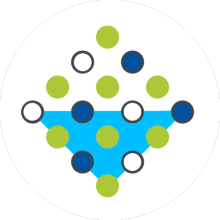General Information
Date: Monday, February 26 to Friday, March 1
Place: Multi Media Lab (MML), U1.003, Pfaffenwaldring 61, 70569 Stuttgart, Campus Vaihingen.
Registration: Registration is closed. If you would like to participate, please contact Edward.Coltman@iws.uni-stuttgart.de
Content of the course
Modeling of blood flow within microcirculation is an interesting subfield in biomedical engineering. A mathematical model for the microcirculation of the human body could enable physicians and pharmacists to obtain better insight into the oxygen supply of cells, the waste removal from the interstitial space, and further important biological processes without performing expensive and risky experiments.
In this one-week course, we develop a mathematical model that can be used to simulate blood flow in microvascular networks supplying a tissue block. Thereby, model reduction techniques are applied i.e. flow in the network is described by a one-dimensional (1D) model, while tissue is considered as a three-dimensional (3D) porous medium. All in all, we obtain a 3D-1D coupled model. In further lectures, the mathematical properties of this modeling approach are discussed. Moreover, appropriate numerical methods are investigated. Some of these methods will be implemented during the course using MATLAB.
Course Schedule
Day 1: Monday (26th February)
Morning lectures (9:00-12:00):
- Motivation and basics from physiology
- Mathematical models for blood flow in microvascular networks
Afternoon lectures (13:30 - 15:00):
- Mathematical models for flow in tissue
Day 2: Tuesday (27th February)
Morning lectures (9:00 - 12:00):
- Properties of the mathematical model (Part 1)
- Properties of the mathematical model (Part 2)
Afternoon lectures (13:30 - 15:00):
- Properties of the mathematical model (Part 3)
Day 3: Wednesday (28th February)
Morning lectures (9:00-12:00):
- Numerical solution methods (Part 1)
- Numerical solution methods (Part 2)
Afternoon lectures (13:30 - 15:00):
- Numerical solution methods (Part 3)
Day 4: Thursday (29th February)
Morning lectures (9:00-12:00):
- Work on programming tasks (Part 1)
- Work on programming tasks (Part 2)
Afternoon lectures (13:30 - 15:00):
- Work on programming tasks (Part 3)
Day 5: Friday (1st March)
Morning lectures (9:00-12:00):
- Discussion of the programming tasks
- Closing remarks
Contact

Kundan Kumar
Prof.Mercator Fellow, Research Project B03



